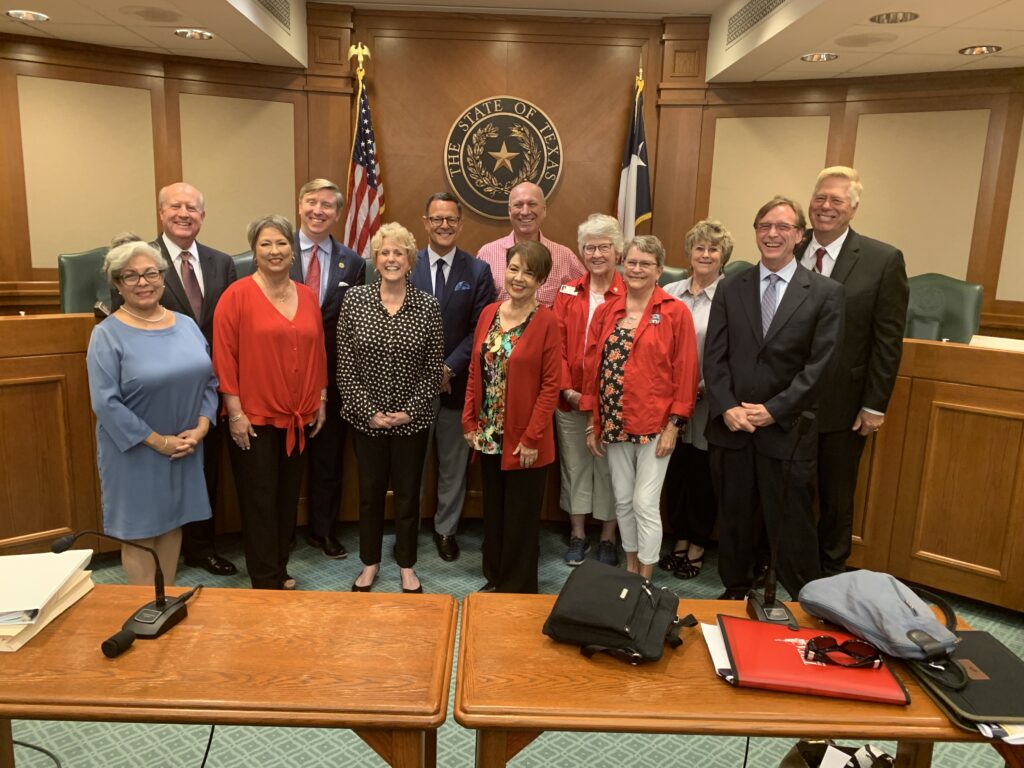Executive Summary:
- The House PIFS Committee received testimony from retirees on a COLA
- Chairman Anchía vowed to make a COLA a priority in the 2023 legislative session
- TRTA provided testimony and is advocating for a meaningful, substantial COLA for retirees
- TRTA’s documentation for the committee is available here
The Texas House Pensions, Investments, and Financial Services Committee (PIFS) met on Monday, June 6, 2022, to review and evaluate the actuarial soundness of the Teacher Retirement System of Texas (TRS) pension fund and to study possible benefit enhancements, including a cost-of-living adjustment (COLA), for TRS retirees.
PIFS Committee Chairman Rafael Anchía used the meeting to focus on meeting the financial needs of TRS retirees. The discussion about a COLA is just the beginning of what will be a deeper look into how much retirees are hurting due to increased inflationary pressure.
More than half of current TRS retirees have never received a COLA. The last COLA that was passed by the Texas Legislature went to those who had retired in August 2004 or before. Legislation to pass a COLA could be considered in the upcoming 88thLegislative Session that begins in January 2023.
TRS Testimony
TRS Executive Director Brian Guthrie reviewed the actuarial soundness of the pension fund. Guthrie stated that the fund was at its highest value ever as of August 31, 2021, at $201 billion. The fund had a 25% return in 2021. Since the war in Ukraine began, the market has taken a tumble, and the pension fund currently sits at around $190 billion due to natural volatility. Guthrie said TRS will continue with its long-term investment philosophy, as there no need to change it due to short-term variances.
TRS presently is actuarially sound and ahead of schedule in paying off its unfunded liability of $48 billion, with a funding period of 23 years.
Guthrie explained that the TRS Board of Trustees is considering lowering the investment return assumption for the fund—the single most significant determinant in the fund being sound—from 7.25 percent to 7 percent, as recommended by TRS actuary Gabriel, Roeder, and Smith (GRS).
The change should also not have an impact on coming legislative decisions about granting benefit enhancements to TRS retirees. Guthrie also provided several potential scenarios on ways that a benefit enhancement could be funded and cost estimates of different types of COLAs.
For example, a COLA could be paid for by allowing the pension fund to finance the cost, which adds liability to the system that can be paid over time. Another method is to pay for an increase upfront, which costs less but may require an outlay from general revenue. There are also multiple options available between the two funding policies.
Guthrie stated that TRS has also started to look at the loss of purchasing power TRS retirees are experiencing and the impact of inflation on their monthly income and will provide information at the discretion of the Legislature.
TRTA Testimony
The Texas Retired Teachers Association’s (TRTA) Executive Director Tim Lee could not attend the hearing due to a family obligation but sent a message of gratitude to Chairman Anchia and the committee members for working with TRTA in the past and agreeing to work with us as we move forward to pursue a benefit enhancement for TRS retirees.
Brock Gregg, TRTA Associate Director Strategic Partnerships and Member Outreach, represented the TRTA staff at the hearing. He began his testimony by saying that “the need is great (for a COLA)…there’s no doubt about that,” adding that “by next session, it will have been 19 years since any TRS retiree received a permanent COLA.”
Compounding the issue is that inflation is the highest it has been in 40 years. “The need is more than we can afford,” Gregg added, but expressed that now is the time to provide a meaningful, substantial COLA, “as substantial as we can afford.”
Referencing the federal Social Security program as an example, Gregg said that SS recipients received a 5.9 percent increase last year and could receive one as high as 8% this year.
Gregg reminded the committee members that a quarter of TRS retirees get $1,000 or less per month in their monthly annuities, while 50 percent receive $2,000 or less.
TRTA members also provided public comments during the hearing.
Susie Hager retired in June 2005 after a 30-year career and had hoped to work five more years before experiencing health issues. She is now unable to do any supplemental work due to being homebound. Hager said, “I consider my service as a calling and never expected a hefty salary,” but she struggles to be able to live on the same income she’s had for 17 years. Like many TRS retirees, she is also subject to the federal Windfall Elimination Provision (WEP).
Nancy Byler, who currently serves as the TRTA State Legislative Committee Chair, retired in 2005 and has never had a COLA.
Byler said she has spoken with active teachers who don’t want to come to Austin to beg for a COLA when they retire. “It’s hard to recruit and retain active teachers when retired teachers are not taken care of,” she added.
She said that “retirees do the best they can with what they have,” explaining that when TRTA speaks, the organization is speaking for all TRS retirees, not just the ones who can afford to pay membership dues.
“The time is now—right now—for a substantial COLA for all Texas public school retirees,” Byler said.
Dora Cackley also serves on the TRTA state legislative committee. She worked as an educator for 32 years in the Rio Grande Valley. She explained that many South Texas counties experience great financial hardship, forcing many retired school personnel to supplement their income. One retiree she knows told her he is cutting back on food by buying cans of beans to make his dollars stretch.
“These were your teachers!” Cackley said.
“We gave our full measure of devotion to all the children in Texas classrooms,” Cackley said, and then asked the committee members to study, evaluate, and execute a COLA for the retirees who are in dire financial need.
Jeanne Paull-Turner said she taught for 40 years, “and I would do it again.” She told the story of a fellow retiree who is a two-time cancer survivor with a house that 44 years old and in need of multiple repairs she cannot afford. Her friend also needs surgery she cannot afford. She described the situation as “horrid.”
“Twenty years with no COLA is just not right…it’s disrespectful,” Paull-Turner said.
Chairman Anchía thanked everyone for their heartfelt testimony, adding he does not know anybody on the committee who is not in “complete lockstep” with the retirees, calling the committee members “demonstrated allies.” Though this hearing did not propose any specific legislation, it is the first step on a path forward for a benefit enhancement for TRS retirees in the 88th Legislative Session.
TRTA thanks Chairman Anchía and all the members of the PIFS committee for making TRS retirees a high priority ahead of the next that begins in January 2023. Our work to help TRS retirees receive a COLA already is kicking into high gear! Please stay tuned to the Inside Line as we continue our work to get all TRS retirees much needed financial relief.
Thank You!
TRTA is the only group that focuses solely on your TRS retirement security! Please join us today!
Thank you for being a member of TRTA and supporting issues that affect retired Texas public school personnel. Be sure to download the TRTA app to receive all of the latest updates and communicate with your fellow retirees.





